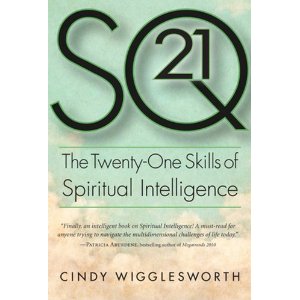
Cindy Wigglesworth
5.0 out of 5 stars Want less drama in your life, then develop your SQ. October 2, 2012
“Becoming fully human is a great adventure – one that requires us to grow and stretch ourselves.” So writes Cindy Wigglesworth at the opening of her book, SQ21: The Twenty-One Skills of Spiritual Intelligence.
In order to frame this review, it is necessary to identify this “great adventure” that we all share because it defines SQ as the ultimate aspiration of our human adventure, and thus the context for much of my work and my excitement about this book.
There are many models of adult human development. The one that I use most often in my work is borrowed and adapted from Sam Keen's wonderful book, The Passionate Life. In it, Keen suggests that adults evolve from being a dependent Child, to a counter-dependent Rebel, to a co-dependent Adult, to an independent Outlaw, to an inter-dependent Lover. These “stages of loving,” as he refers to them, are the normal stages of the great human journey. For years I've targeted the end as the “Consciousness of Christ.” Different traditions define it in their terms, but this is the one that is most familiar to me, and the people with whom I work as a therapist and consultant to family businesses. Whether it is Buddha nature, to be like Jesus, the Pope, Gandhi, Mother Teresa, Mohammed, Martin Luther King, Jr., Nelson Mandela, Thomas Merton… or to put on the Consciousness of Christ, it is the goal, the ultimate human aspiration of adult development.
The struggle I've had in my work has been with defining what the Consciousness of Christ means in the real world of home and work life. That struggle has been resolved with Wigglesworth's work on SQ. I can now say, with conviction, that the goal of adult human development is to become “spiritually intelligent,” to develop the twenty-one skills of SQ. Importantly, I can say so in a faith neutral way so that no one religious tradition hijacks the spiritual journey.
Wigglesworth writes, “Spirituality, as I define it, is the innate human need to be connected to something larger than ourselves, something we consider to be divine or of exceptional nobility.”
“Religion, as I define it, is a specific set of beliefs and practices, usually based on a sacred text, and represented by a community of people.”
“Spiritual Intelligence, as distinct from both spirituality and religion, is a set of skills we develop over time, with practice…. It is the ability to behave with wisdom and compassion, while maintaining inner and outer peace, regardless of the situation.”
Part 1 of Wigglesworth's book briefly addresses the call to become fully human. It then moves on to align SQ with the other intelligences of which we are familiar, such as Emotional Intelligence (EQ), mathematical, linguistic, kinesthetic, and so forth. SQ is the “master intelligence,” for it builds upon PQ (physical intelligence), IQ, and EQ. The third part introduces the reader to the research method behind the SQ21.
Part 2 digs into the four quadrants and the 21 skills of SQ with a model that is built upon the four quadrants of Goleman's work with EQ. For those familiar with Ken Wilber's four quadrants, if you re-arrange Wigglesworth's quadrants, you find alignment with Wilber's model. The first quadrant in SQ focuses on developing awareness between one's Ego Self, and one's Higher Self. The next focuses on developing Universal Awareness. The third quadrant is about Self Mastery, and the fourth is about Social Mastery and Spiritual Presence. The quadrants identify 5, 6, 5, and then 5 more skills to make up the 21 of Spiritual Intelligence.
Part 3 supports the never-ending development of your SQ. Wigglesworth likens the whole process to weightlifting. She then offers nine steps that are recommended for shifting from the fear-based ego self to the more awakened Higher Self. The challenge, of course, is to normalize the development of these 21 skills into everyday life. Three exercises are offered to support the effort.
There are two Appendices; one is on the research methodology behind SQ, and the second is a helpful glossary of terms.
Let me say a word about leadership and SQ. There is evidence to support the assertion that the most mature leaders among us also have high Spiritual Intelligence. That is, those among us who truly lead us to more imaginative ways of thinking and being together as communities of life, are those who have transcended and included one stage of adult development, and then another, and then another, cultivating more Spiritual Intelligence along the way. Leaders, be they parents or presidents, would help us all if they developed more SQ.
And, who doesn't want to live with less drama at home, or in the workplace? The higher one's SQ, the less drama there is in life. Is it easy? Of course not. Is it worth it? The very quality of life, as individuals and as communities, seems to depend upon it.
Someday, a year or two from now, there will be room for a follow-up book, a field guide for applying the SQ21 personally, in relationships at home, and at work. I look forward to that. A lot of people will have to work at cultivating their Spiritual Intelligence, and then give Wigglesworth some feedback on tools, tips, and techniques for growing SQ.
Less drama and more wisdom. If the SQ21 helps, as it should, then we will all be better off.




